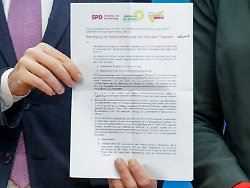Wednesday October 27, 2021
Replacement for paragraph 28a
The traffic light plans these corona rules
By Hubertus Volmer
Key points of the traffic light parties: The particularly controversial Paragraph 28a, Paragraph 1 of the Infection Protection Act is to be abolished, the Corona measures as a whole are to be “less intervention-intensive” and will finally expire on March 20, 2022.
The traffic light coalition is not yet in place, but it already has a plan for how the corona policy should continue. Central point: The “epidemic situation of national scope” that has been in force since March 2020 is to be ended.
The term comes from Section 5 of the Infection Protection Act. It provides that the Federal Government or the Federal Minister of Health can put various measures into force by ordinance, as long as this “epidemic situation of national scope” applies. Since March 2021, the determination of the epidemic situation has to be confirmed by the Bundestag every three months, otherwise it will expire. The last time Parliament did this was on August 25th with the votes of the grand coalition; November 25th is three months over. At that time, the opposition voted unanimously with no. Once again, the incumbent Federal Health Minister Jens Spahn from the CDU would not want to prolong the epidemic situation.
“The epidemic situation of national scope according to § 5 IfSG ends at the end of November 24, 2021”, it says in a two-page key issues paper on which the SPD, Greens and FDP have agreed. “It will not be extended. Because its prerequisites are no longer available.” SPD parliamentary group vice Dirk Wiese, the Green parliamentary group chairman Katrin Göring-Eckardt and FDP parliamentary group manager Marco Buschmann presented the key points at a joint press conference.
No lockdown, no school closings
Buschmann point three of the key issues paper was particularly important: “The aggressive catalog of measures” from the particularly controversial Paragraph 28a, Paragraph 1 of the Infection Protection Act will “no longer apply after the end of the epidemic situation in Germany,” it says. The federal states are then no longer allowed to impose measures such as a lockdown on their own initiative. “School closings, lockdowns and curfews will no longer exist with us,” said Wiese. The SPD politician emphasized at the same time that November 25th should not be “Freedom Day”, i.e. not a day on which all measures will be abolished.
A new legal basis should apply by the beginning of spring on March 20, 2022. The federal states should be able to order the following measures during this “transition period” “insofar as they are necessary to prevent a renewed dynamic spread of Covid-19” and which should expire on March 20 at the latest.
- Mask requirement
- 3G rules in areas “that are particularly suitable for contributing to the spread of Covid-19”
- Hygiene concepts for events, businesses and restaurants
- “Distance requirements in public space, by which primarily public indoor spaces are meant”
- Processing of contact data, for example in restaurants and shops, “without excluding people without mobile devices from public life”
- Requirements for the operation of schools, universities and the like
The paper states that these are “less intrusive measures” than those previously possible. In the press conference, Buschmann made it clear that the end date of March 20 applies provided that no dangerous mutations or other unexpected problems occur by then.
The special rules on the compensation claim of working parents who are affected by quarantine measures in daycare centers and schools are to be extended. The powers of employers to save their employees’ vaccination status data will also be extended; So far this only affects the employees of care and training facilities as well as mass accommodation. Also the simplified access to basic security introduced in the pandemic as well Measures of the Corona occupational health and safety ordinance should be retained. All of these renewals end on March 20th. In addition, the special regulations on children’s daily allowance should apply. The suspension of the minimum income limit at the artists’ social insurance fund is to be extended until the end of 2022.
The vaccination rate is to be increased
The intensive care register set up in spring 2020 by the German Interdisciplinary Association for Intensive and Emergency Medicine (DIVI), in which, among other things, intensive care bed capacities are recorded, is to be “permanently established and expanded” “in order to improve the data basis for future evidence-based decisions”. With this, the traffic light parties want to get even further away from the view of the seven-day incidence. This is not completely new territory: In view of the high vaccination rate, politicians have long since moved away from simply looking at the number of infections.
The future coalition is to undertake “a fundamental revision” of the Infection Protection Act, it says in the key issues paper. In order to increase the stagnant vaccinations, a “practice panel” is to be convened in November to find ways “to significantly accelerate vaccination progress”.
The Bundestag should decide on the new regulation on November 11th, i.e. in the first regular week of session of this legislative period. The Federal Council would have to give its approval in a special meeting before November 24th, probably on November 19th. The democratic parliamentary groups in the Bundestag should be involved in the drafting of the concrete draft law, as Göring-Eckardt said. A spokesman for Health Minister Spahn assured the support of the ministry.
